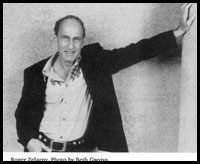 Betancourt was authorized by the Zelazny estate to write a new trilogy of Amber novels; this one about the founding of Amber. This explains the title page, which actually reads Roger Zelazny’s The Dawn of Amber. Amber is not the first property where continuations have been authorized by estates of authors, nor is it likely to be the last.
Betancourt was authorized by the Zelazny estate to write a new trilogy of Amber novels; this one about the founding of Amber. This explains the title page, which actually reads Roger Zelazny’s The Dawn of Amber. Amber is not the first property where continuations have been authorized by estates of authors, nor is it likely to be the last.
The intent (according to the jacket) is to answer questions about the founding of Amber, about the origins of Oberon and Dworkin, and why Amber and the Courts of Chaos are in conflict. Betancourt tackles the assignment with energy.
The story plunges straight into action with the main character Oberon (called “Obere” initially) fighting hell-creatures. Dworkin, whom he regards as an uncle but who has been absent from Obere’s life for years, shows up to help him fight these monsters. Dworkin conveys him well away from that conflict, through strange lands, to their destination: Dworkin’s castle Juniper.
Obere learns that he is, in fact, one of Dworkin’s sons. It’s a large family of very diverse personalities, each with different ambitions. He is plunged into power games and war conflicts of which he knows very little. But he becomes committed to his new world.
 Inevitably, there is a contrast between Betancourt’s handling of the material and that of Zelazny. Betancourt lays out the plot and action in a way that can satisfy Zelazny’s readers. But the greatest distinction between the two authors (at least in this material) is stylistic. Betancourt does not have Zelazny’s hand for prose – that special quality that carries an author’s voice. Because for me as a reader Amber is very much Zelazny’s, I found myself conscious of the differences between the two authors at times.
Inevitably, there is a contrast between Betancourt’s handling of the material and that of Zelazny. Betancourt lays out the plot and action in a way that can satisfy Zelazny’s readers. But the greatest distinction between the two authors (at least in this material) is stylistic. Betancourt does not have Zelazny’s hand for prose – that special quality that carries an author’s voice. Because for me as a reader Amber is very much Zelazny’s, I found myself conscious of the differences between the two authors at times.
I felt that Betancourt labored a bit too hard to echo Zelazny. He opens with Obere being as clueless about his real identity as Corwin is in Nine Princes in Amber (although the reasons for the cluelessness are adequately different). The introduction of the siblings is also similar, right down to the engaging but over-looked brother (Random in Zelazny’s work, Aber in Betancourt’s). I could wish for fresher plotting than that. But aside from that glitch, readers familiar with Amber should be satisfied with this first volume in this trilogy, if only for a fresh dose of Amber.
